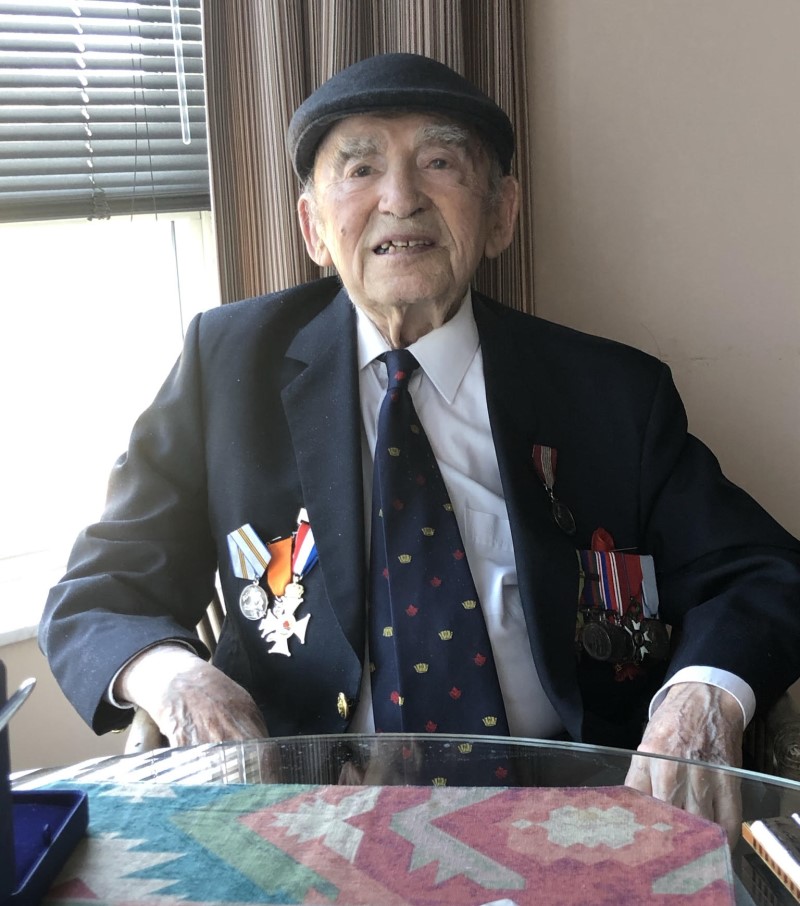D-Day veteran recounts wartime experiences to school children
Alex Polowin passed away on August 16th, 2022 in his 99th year. Alex was a decorated war hero and proud Canadian Veteran.
June 21, 2022 - Royal Canadian Navy

Caption
Alex Polowin
By Peter Mallett
Alex Polowin, 98, the last surviving crew member of His Majesty’s Canadian Ship (HMCS) Huron, was in the thick of it during the Second World War.
He and his crewmates, who served during the Battle of the Atlantic, contributed to the war effort by protecting convoys and supporting Operation Neptune and the D-Day landings at Normandy in June 1944.
The Tribal-class destroyer was also present at the Battle of the North Cape off the northern coast of Norway in 1943, when the German battleship Scharnhorst was sunk.
One of Mr. Polowin’s favourite pastimes is telling school children the story of his military service. He was born in Lithuania in 1924 before emigrating with his family to Canada, and was one of 17,000 Canadian Jews who enlisted.
For most of his talks to schools and community organizations, Mr. Polowin proudly displays the impressive rack of medals on his service jacket. They include the Atlantic Star, Diamond Jubilee, Arctic Star, Russian Peace Medal, Order of Ushakov and the French Legion of Honour. Last year he also received Canada’s Sovereign Medal for volunteerism for his talks to students and others.
In September 2021, Mr. Polowin was given a guided tour of HMCS Haida, now a Government of Canada Historic Site located in Hamilton, Ont. He says he was treated like royalty.
“Me, a former Able Seaman, they piped me on board the ship and everyone saluted me,” he recalls. “Wow, I thought, if my friends on board the Huron could see me now.”
The Holocaust
As a child in Ottawa when he was not in school, he would often work with his father, who was a door-to-door salesman. He watched in horror how the Holocaust unfolded during the war in Europe.
“I used to watch my mother cry when she learned her brothers and sisters had been murdered,” he said. “That’s when I started thinking of ways I could help the war effort.”
The decision, Mr. Polowin says, was an easy one. As a 17-year-old, he required his father’s signature to enlist. He then completed his basic training in Halifax.
Mr. Polowin worked as a boatswain’s mate, wheelsman and as part of crew manning the ship’s guns. During the war he also served aboard the Flower-class corvette HMCS Pictou, and a River-class frigate HMCS Poundmaker, but most of his days he spent in Huron.
Mr. Polowin notes anti-Semitism was present not only in Europe. He shared his experiences of dealing with racism in the Royal Canadian Navy in historian Ellin Bessner’s 2019 book Double Threat: Canadian Jews, the Military and WWII.
The sinking of Scharnhorst
On December 26, 1943, Mr. Polowin was heading to the Soviet Union in HMCS Huron when Germany’s most famous battleship, Scharnhorst, disrupted the convoy.
Huron provided protection while Royal Norwegian Navy destroyer Stord, Her Majesty’s Ship Duke of York and other British warships eventually sank Scharnhorst. Although it marked a turning point in Battle of the Atlantic, Mr. Polowin says there was little rejoicing after Scharnhorst went down.
“There was no cheer on board Huron when we received news of her sinking, just happiness it was them rather than us,” says Mr. Polowin. “But I realized there were nearly 2,000 crew members on board, all sailors like us, and only 36 survived. Those killed weren’t only German, there were 300 Polish men on board too.”
He also played an important role in the D-Day landings as Huron patrolled the English Channel to prevent attacks on the Allies’ landing crew. Mr. Polowin says he remains thankful he was not in the first wave of soldiers to land on the beach.
“I often thought of how the first guys who landed on the beaches of Normandy felt,” he says. “Can you imagine the level of fear they must have felt?”
After all he had been through, Mr. Polowin was just 20 when the war ended. He spent most of his post-war life working in sales and insurance. He was married twice and has three children. Mr. Polowin is a talented harmonica player and a lifelong fan of the Canadian Football League.
He also likes to get out into the community and tell people about the war. With assistance from Historica Canada’s Memory Project, Mr. Polowin has given over 200 talks at schools, community centres and veterans’ homes. He says he has relished every moment of those talks.
“If we are not around to tell them, how are they going to know, and who is going to tell them?” he says. “I want people to know I am fortunate to be me, to have survived the war and done my little share to bring peace and make Canada and the world a better place.”